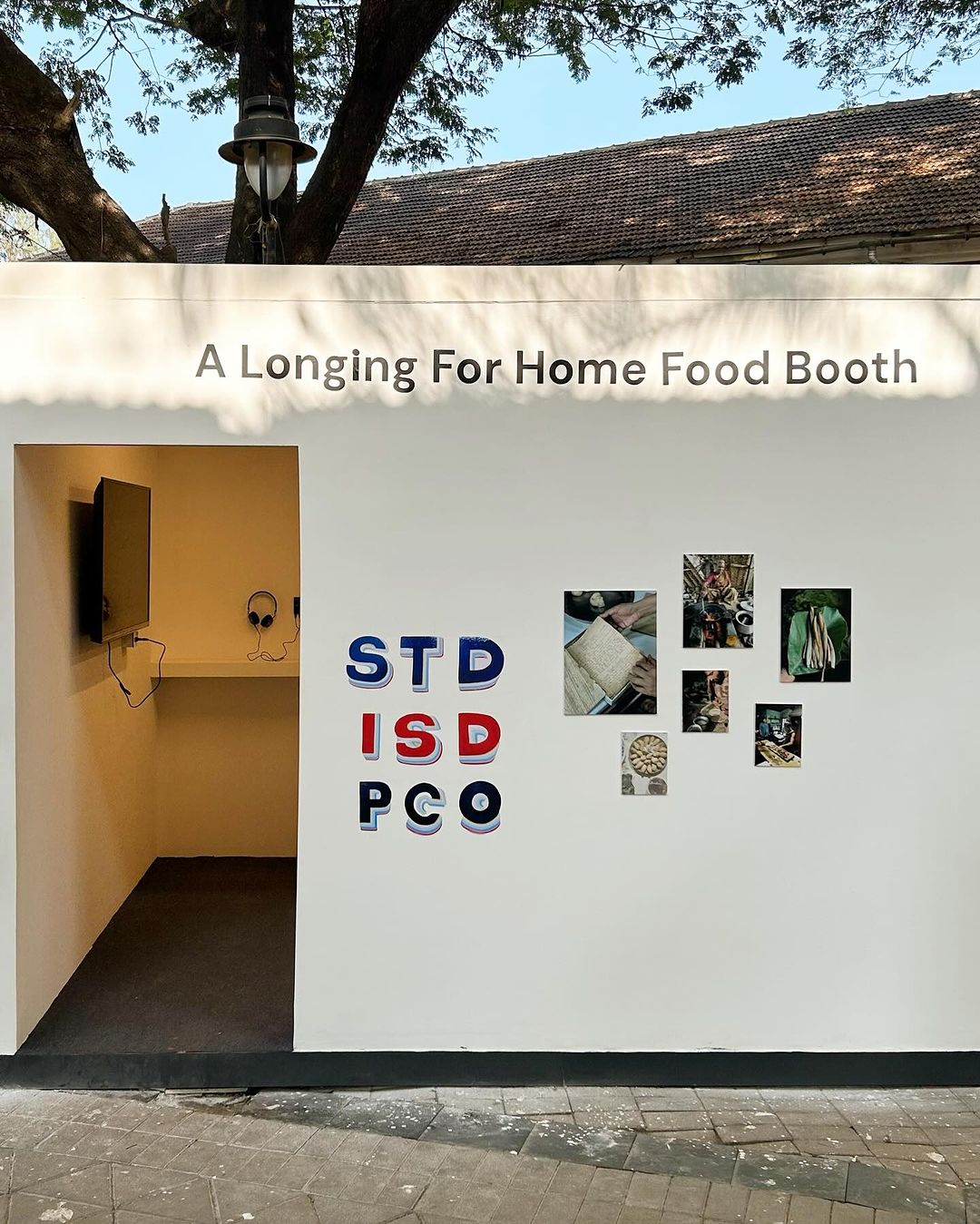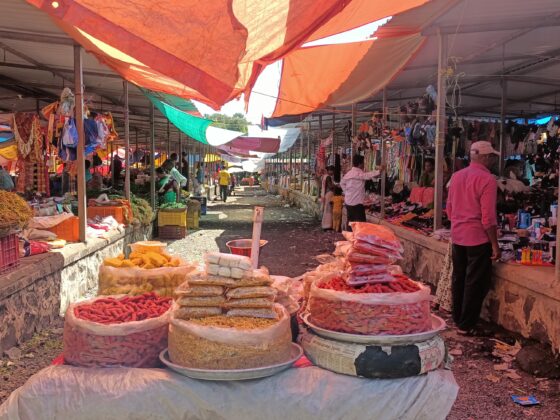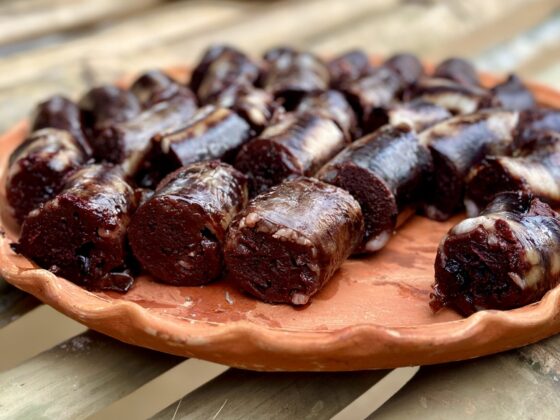‘A Longing for Home Food’ Project, an offshoot of the curation at the eighth edition of the Serendipity Arts Festival, is a listening experience cataloguing people’s oral food memories and recipes through conversations that invoke a familiar sense of home.
Through the course of our lives, many of us find ourselves living far away from loved ones, having to move to unfamiliar cities, surrounded by people we don’t always know. During such times, we often long for familiar flavours that remind us of home. We take great comfort in our families’ and communities’ treasured recipes, which make us feel connected to home through the food we eat.
Why do this?
‘A Longing for Home Food Booth’ began as an installation to capture this very sentiment at our Culinary Arts curation at the Serendipity Arts Festival (2023).
Inside the booth, attendees were able to listen to a diverse set of voices share their intimate relationship with food and family, and watch some of their stories come to life through Hariom Verma’s animations. Inspired by its success, over the last few months, members of The Locavore team have been sourcing stories and recipes from across India to build a collated audio repository.
Our hope is that this repository serves as a celebration at the intersection of food, memories, and stories—where the simple act of sharing recipes with your loved ones transforms into a participatory ode to our collective culinary heritage.
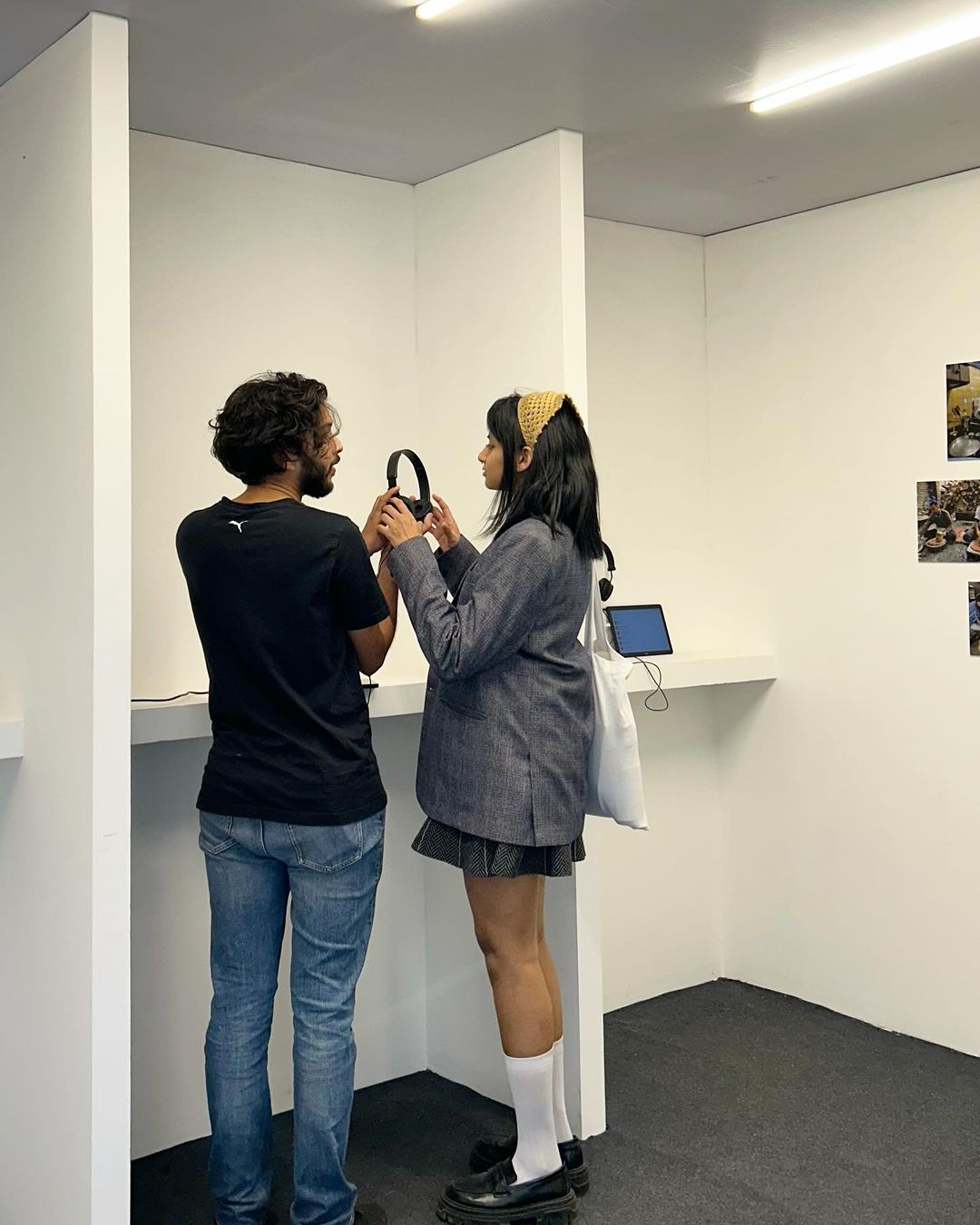
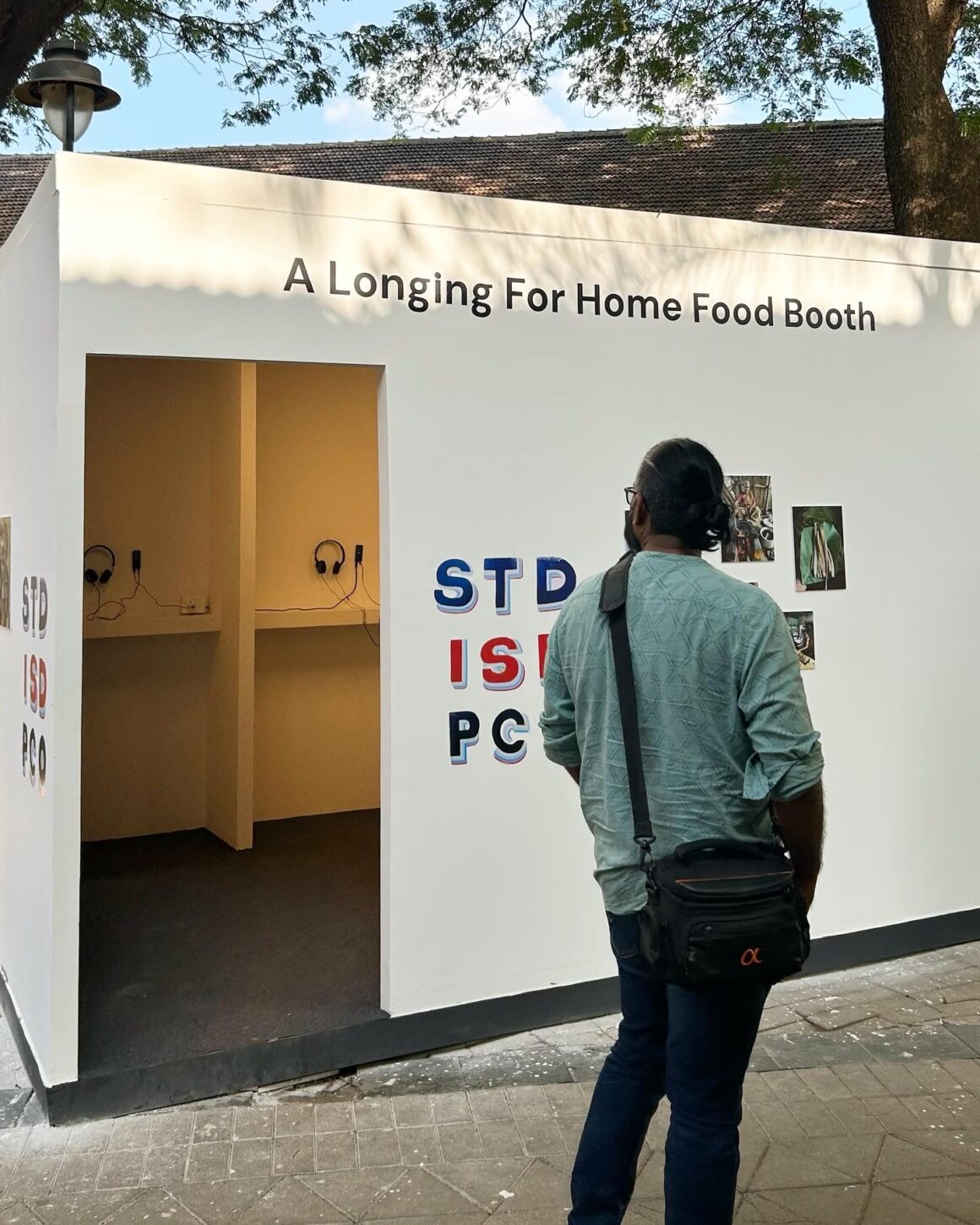
Here are some audio stories we have curated so far:
Paya Soup: Auroni and Aniruddha Mookerjee
Auroni Mookerjee’s father, Aniruddha Mookerjee shares that his first food memories were of visiting a butcher with his father, where he learnt about different cuts of meats and parts of an animal. As they discuss their family’s recipe for paya soup, we realise how both of their childhood experiences of eating and cooking offals such as trotters, enables them to deeply understand meat as a source of care and nourishment.
Tival: Disha Pinge
When Disha speaks of tival, a sweet-and-sour kokum based drink, she describes it as though it was made for her. Although the drink isn’t seasonal, her memories of it are; her grandmother would prepare it for her every summer afternoon, to be had with lunch.
Atte ka Halwa: Tansha Vohra and Bhanu Roy
Bhanu Roy, a seasoned cook in Tansha Vohra’s home in Bangalore, has mastered the family’s culinary heritage over 22 years, guided by recipes from Tansha’s grandmother. While Tansha seldom savours these traditional dishes, Bhanu’s atte ka halwa instantly transports her back to the cherished flavours of her grandmother’s kitchen.
Pappa nu Ghosh: Lamiya and Adil
Cousins Lamiya and Adil believe their collective love and affinity for cooking lies in their genes. This is true in many senses as they first developed a passion for food in their grandfather’s kitchen, watching him experiment with new recipes. As they discuss their grandfather’s signature roast meat dish, they revel over how his recipes and techniques stand the test of time, with the meat from the pappa nu ghosh as tender as their first memory of it.
Mutton Pulao: Mayuri and Ravi
As Mayuri and her papa reminisce about the rich mutton pulao prepared by their family cook for Sunday lunch, Mayuri remembers a related food ritual. In the lead up to the pulao, the cook would reserve the first taste of the fresh mutton, in the form of the broth the mutton had been cooked in, for her. As the pulao vividly rests in Mayuri’s memories, it is the taste of this fresh and flavourful mutton broth from her childhood that Mayuri longs for.
Panjiri: Shreshtha Chhabra and Shashi Chhabra
Shreshtha Chhabra and her paternal grandmother Shashi Chhabra discuss how to make panjiri, a warm and comforting winter dish made to soothe a sick throat. Made with rotis and ghee, Shashi swears by panjiri as medicine for an ailing person, the recipe for which she learned from her mother-in-law after she got married.
Aloo Dahi ki Sabzi: Ashish and Mamta
In this conversation between Ashish and his paternal aunt, Mamta, they discuss their shared favourite family recipe, aloo ki dahi ki sabzi. Boiled potatoes are gently simmered in a light yoghurt gravy to make this Rajasthani dish. To the utter confusion of the rest of the family, Ashish and Mamta love to eat the sabzi with white bread. Mamta, who would often feed Ashish when he was a child, instilled the love for this strange yet comforting sabzi-bread combination in him.
Dal Fara: Ankita
Out of all of the food her mother makes, Ankita’s favourite of hers is dal fara, a bread-like dish stuffed with a paste made with a mix of dals. Her most distinct memory of the dish is disliking it, and refusing to eat it as a child. Now, a professional chef, she shares her recipe for it with us.
Seb ki Kheer: Shreshtha Chhabra and Shashi Chhabra
Shreshtha Chhabra and her paternal grandmother, Shashi Chhabra discuss how to make the seb kheer Shashi makes using apples. Its subtle sweetness and unique texture have made the sweet dish a family favourite, with members often demanding that Shashi make it for them. Shreshtha, who has never tasted this dish, often craves it from her family’s memory of it alone.
Rasha: Sreetama Sen and Dipa Sen
Sreetama Sen and her mother, Dipa Sen discuss Sreetama’s grandmother’s recipe for rasha, a spicy vegetable stew akin to shukto, made special with fried poppy seed balls. On Sundays, when rasha was made at home, Dipa didn’t feel the absence of meat and fish on the table. She passed this appreciation for the dish down to Sreetama, who first learnt to appreciate Bengali vegetarian fare through this dish.
Chutagi: Theystan Chukki
For Theystan Chukki, cooking is a skill learned through observation alone. She shares her recipe for chutagi, a brothy dish made with round wheat dumplings and meat, which she picked up from her parents. Growing up, Theystan’s father encouraged her to eat local dishes and experience flavours distinct to the region; it was important to him that Theystan appreciate her culinary heritage. Now, when she travels outside of Chumarthang, she misses the taste of Chutagi.
Bikaneri Chai: Shreshtha Chhabra and Shashi Chhabra
Shreshtha Chhabra and her paternal grandmother, Shashi Chhabra discuss Shashi’s memories of the delicious chai sold near her home in Allahabad, where she grew up. While Shashi and her family drank this chai daily, they only later learnt about how its distinct taste, which drew all of them to it, came from the inclusion of poppy seeds in the tea blend. Over the years, Shashi has perfected her own version of this Bikaneri chai.
Coloured Cake: Riya Behl, Nikita Behl, Charmaine Behl, and Marie Rosario
In Marie Rosario’s kitchen, the coloured cake is an evergreen staple. She, along with her daughter, Charmaine Behl, and her granddaughters, Riya and Nikita Behl, discusses her memories of baking and eating this cake on important days with all of her grandchildren. Both Riya and Nikita remember how they marvelled at the perfectly distinct patterns of colour in the warm baked cake, and how today, the cake tastes just as good, with the flavours just as welcoming as they have been for decades.
Manja Vaada: Sumaiya Mustafa
Sumaiya Mustafa, who wrote about Kayalpatnam in Tamil Nadu for a piece on food memories for The Locavore, shares her recipe for manja vaada, a snack from her coastal hometown that connects her to her cousin living in Luxembourg.
Didu'r Payesh: Anindita Ghose and Amrita Choudhary
Having neglected learning this recipe while she was growing up, Anindita began realising the value of this bit of family knowledge while living away from home. She wanted to perfect the dish to recreate for her friends’ birthdays, a popular Bengali ritual, and carefully picked up the recipe over several calls with her mother. Amrita, Anindita’s cousin, and she discuss how didu’r payesh can only be made with full fat milk from a dairy, gobindobhog rice, and good nolen gur.
Churri: Shreshtha Chhabra and Shashi Chhabra
In this conversation between Shreshtha Chhabra and her paternal grandmother, Shashi Chhabra, Shashi shares her recipe for churri, a cherished winter snack, and her beloved culinary ritual of making it on Nag Panchami every year. She only learnt this recipe post her marriage, as a means to preserve a family tradition that has survived generations.
Blood Sausages: Rigzin and Tenzin
Rigzin and Tenzin, from the Bodh community in Himachal Pradesh, share their recipe for blood sausages. Rigzin distinctly remembers being served this delicacy by his father when he was small. Tenzin too traces his first memories of blood sausages to his childhood; he learned how to cook the dish by watching his father prepare it. Today, they add new ingredients as flavouring to the dish; as people from the community leave the region and return, taste preferences and palates evolve.
Khageena: Mehvash Arslan and Shahina Kavarana
Although a self-proclaimed bad cook, Mehvash has learnt to make one dish and do it well, Khageena. This spiced and flavourful egg dish was taught to her by her mother, Shahina Kavarana, who learnt it by watching her mother, who instinctively learnt it from hers – Khageena has been preserved in the family through generations of daughters. During the pandemic, Mehvash deeply craved the taste of Khageena, and prepared it for her friends for breakfast.
Lahori Bakery: Shreshtha Chhabra and Bhimsen Handa
Shreshtha Chhabra, who lives in Bangalore, talks to her maternal grandfather, Bhimsen Handa who lives in Sonipat. Bhimsen grew up in pre-partition India and shares his memories of the taste of biscuits from a community bakery in Mughal Pura, Lahore which he frequented as a child. Their conversation reveals the strength of food as a medium to learn about our loved ones and their histories.
Parande: Tarana Khan and Fauzia Khan
Tarana Hussain Khan, food historian and writer, speaks to her aunt, Fauzia Khan about pasande, a mutton gravy dish from Rampur, their hometown in Uttar Pradesh. Tarana asks Fauzia, who she calls Fauzia khala, to share Tarana’s grandmother’s original parande recipe, which only Fauzia remembers and makes true to the original.
Wild Food Festival Edition
For Wild Food Festival 2024 in Mumbai, The Locavore in collaboration with OOO Farms presented a curated selection of audio recipes that featured wild foods, brought to life through the many memories and connections built around them. Click to listen below:
Shevlachi Bhaaji: Neil Khopkar and Mitali Minar Korde
Neil Khopkar and his aunt Mitali Minar Korde belong to the Chandraseniya Kayastha Prabhu community of Thane and Raigad districts in coastal Maharashtra. Here, they reminisce about five variations of the beloved Shevlachi Bhaaji, made with the elusive monsoon stalk.
Bagari Bhaat: Archana Shivhare and Kiran Sakharkar
For food researcher Archana Shivhare and her cousin Kiran Sakharkar, the humble Bagari Bhaat has held a special place in their family for generations. It is made with “basmati leaves”—also called annapurna leaves—which grow in the wild in the southern region of the Sahyadris.
Kantoli ka Sabzi: Arya Patil, Rajasi Patil, and Sunita Patil
Arya and Rajasi Patil, with their grandmother Sunita Patil, share their memories of Kantoli ka Sabzi, and the vegetable’s much-awaited arrival during the monsoons.
The Locavore team
Fardeen Imdad Borah, Shreshtha Chabbra, Zainab Kapadia, Ishna Kharbanda, Raj Mishra,
Sreyasi Mukherjee, Mayuri Nigam, Oishika Roy, Ashish Sharma, Yamini Vijayan, Thomas Zacharias.
Showcase Your Family Recipe
Do you have a family recipe you’d like to showcase? We’d love to record, archive, and share it as part of our project. Participating is simple—sign up, and we’ll arrange a virtual call where you and a loved one can share your recipe and the stories that make it special.

